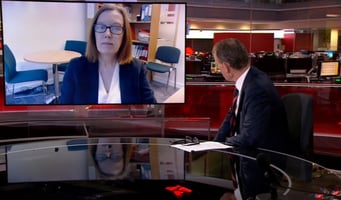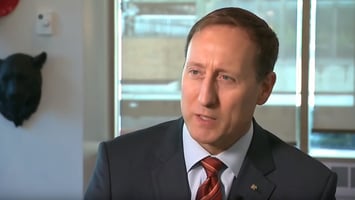You won’t be surprised to learn that as a media training company, we watch a lot of interviews.
So, now we know what it looks like when a spokesperson effectively walks out of a remote interview.
Viewers of Good Morning Britain saw a spokesperson simply turn off her webcam when she had enough of the line of questioning - not an approach we would recommend on our remote media training courses.
And, while it looked less dramatic than storming away from a face-to-face interview, it created many damaging headlines and social media posts.
The ‘walkout’ – or switch-off - happened during a fiery exchange between cabinet minister Therese Coffey and hosts Piers Morgan and Susanna Reid.
It started to go wrong when the politician suggested Britain's ageing population and obesity problems were factors in the country’s high numbers of covid deaths.
When Mr Morgan probed those seemingly unguarded comments and asked whether she was blaming the public for being “too old” and “too fat”, Ms Coffey accused the host of saying something “very insulting.”
And from there, proceedings descended into an argument, with Mr Morgan wanting to know what was insulting about repeating Ms Coffey’s words back to her and the politician insisting she had to go to another interview because this one had started late.
Ms Coffey said: "I also have to point out that you started this interview late. Unfortunately, I have to go to other broadcasters as well, and I wish we had more time."
And Mr Morgan replied: “I haven't interviewed you since May, so you can come back any time.
"It was you that boycotted the programme. Please don't play the 'we haven't given you enough time' card, because we gave you eight months and you didn't turn up."
And with that, the politician reached over and turned off her webcam.
⚡️ “DWP Secretary Therese Coffey 'walks out' on GMB interview”https://t.co/sy4PCspqg1
— Good Morning Britain (@GMB) January 25, 2021
Perhaps not surprisingly, the interview was almost immediately the result of several newspaper headlines. Here are just a few examples.
Ms Coffey also found herself trending on social media and the posts would not have made pleasant browsing on her timeline.
A remarkable exchange on #gmb. When @piersmorgan asks Thérèse Coffey why the UK has the worst Covid-19 death rate in the world, she says age and obesity are factors.
— David Beckett (@iamdavidbeckett) January 25, 2021
When Morgan summarises, she accuses him of being insulting and ends the interview.pic.twitter.com/DqpDTsko1P
But why are we telling you about this?
Well, it shows that walking away from remote interviews can be just as damaging as storming away from a face-to-face one.
We’ve always stressed on our media training courses the importance of spokespeople remaining calm, no matter how challenging the interview becomes.
Showing frustration and walking away not only makes interviews memorable for the wrong reasons, but also puts them in front of a wider audience. Ms Coffey made several media appearances yesterday, but the Good Morning Britain one is the only one people have been talking about.
Additionally, when you walk away – or turn off your camera – you lose the opportunity to have any influence on the narrative. Just because she was no longer taking part in the programme didn’t mean the presenters stopped talking about what she had said.
Mr Morgan continued the item by saying: “She throws out two reasons why we have the worst death toll in the world, apparently: we have an ageing population – so we're too old –and we have an obesity problem – we're too fat.
"When I said, 'So it's the public's fault, is it? We're too fat and it's nothing to do with the Government.' I was the one insulting?"
We should say that Ms Coffey took to Twitter to defend her actions, saying that she had a tight schedule of interviews.
And there is no reason to doubt that, as she had been sent out to do the Monday media rounds. But the timing of her sudden departure seems at least a bit suspicious, coming immediately after a difficult question and the likely realisation that she was talking herself into tricky territory.
In my experience of organising multiple interview slots, you tend to factor in a bit more than five minutes for any logistical issues or overrunning interviews. Or, if you are being interviewed by Mr Morgan, who tends to hold longer interviews.
But, tight schedule or not, this just looked like an attempt to dodge the issue and that, in turn, became a story of its own.
Ms Coffey needed to at least provide an answer to that question, which was based on her own words, before trying to bring the interview to an end. She could have used some of the time she used talking about her need to end the interview to provide an answer.
Now, I think there is an argument that Ms Coffey could have been treated a little differently if the government was on better terms with the broadcaster – it is important to remember that this was the latest episode in a pretty acrimonious relationship that has seen the government boycott the programme for months.
Had things been a little less fractious, my media training advice would have been for Ms Coffey to suggest she came back the following day to discuss the obesity/age question in more detail. Or, even better, promise to ask a subject expert to be interviewed.
It is called media relations for a reason.
My bet is Ms Coffey may have a bit of time to consider the media training lessons from this interview – it could be another eight months before she is seen on Good Morning Britain again.
Media First are media and communications training specialists with over 35 years of experience. We have a team of trainers, each with decades of experience working as journalists, presenters, communications coaches and media trainers.
Subscribe here to be among the first to receive our blog.




